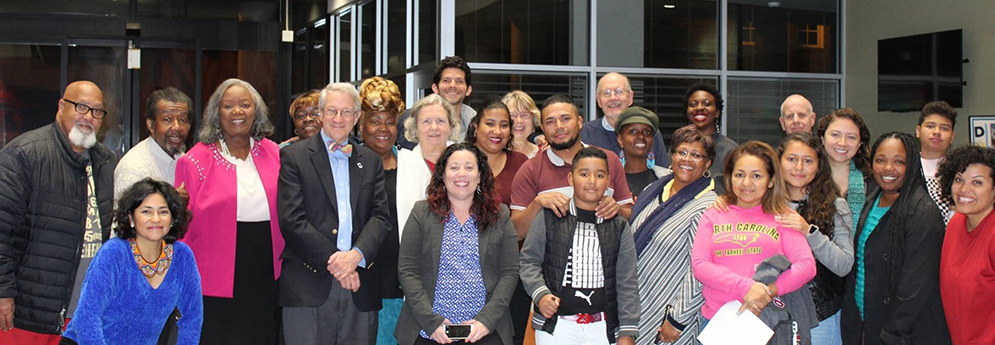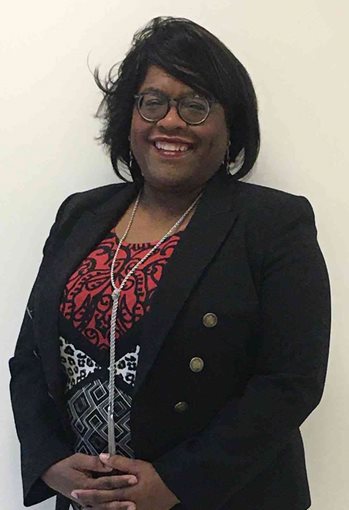This year has been full of projects for NeighborWorks America's network organizations: new homes, refurbished buildings and community gatherings, just for starters. With each project, there are new things to learn and adjustments to make. NeighborWorks spoke with representatives from across the country to learn some of their takeaways from 2019. Today, we're sharing lessons from the Southern Region and the Midwest. Read our second blog post in the series for lessons learned from the Northeast and Western Regions.
Documenting community stories
When the staff at North Carolina's Durham Community Land Trustees (DCLT) began work on the Alma Street PhotoVoice project, they had some expectations. The project would capture the stories and experiences of the people who lived on Alma Street. It would help bring the community, largely African-American and Latinx, together. But as with every project, there were lessons to be learned.
For one thing, says Mina Ezikpe, community organizer for DCLT, it took much longer than they thought it would. They knocked on doors up and down Alma Street. They had conversations and photography workshops. They held meetings. And because many people in the community spoke Spanish, conversations had to be repeated and interpreted. "We knew, okay, this community primarily speaks Spanish, but as we got into the project it became obvious: This takes a lot of time, a lot of resources," says Ezikpe, who speaks both languages.
But building relationships takes time, too, Ezikpe says. In the end, it was worth it.
Along with building the project, they were building trust. "It was really a lot of getting to know people and getting them to know us," says Ezikpe. "Now I definitely feel that we have relationships with the residents we talked to and with their neighbors. It can be a challenge, getting relationships beyond the landlord-tenant relationship. It just takes time getting to know somebody."
Ezikpe's team decided to embark on the project after attending the Community Leadership Institute, sponsored by NeighborWorks America. They spent 10 to 20 hours a week on the project, from March to November, and completed five full story panels in English and Spanish. They held meetings and a neighborhood block party and came away with a commitment to work together. Phase II will be social action, and Ezikpe says she's hoping to engage as many neighborhood residents as possible, in addition to reengaging the families who told their stories. "We're going to see what action we can take together."
Other project takeaways:
- Youth: "We talked about engaging young people more. We worked with youth and teenagers, but they may need a separate space to do this kind of work."
- Language: It's important to have people on your team who can speak the languages represented in the community.
- Timing: For timing and pacing, follow the lead of the community. Ezikpe says her team needed to be flexible to match both schedules and momentum. They planned their block party in just a week, she says, to take advantage of energy after an especially good meeting.
- Relationships: "Relationships are everything. Everyone says that, but it's true. If you want to make a change you really have to start with the relationships between people. It's not always the issues first; it's the relationships first."
The art of the ask
 "Let me tell you a story," begins Cheryl Stephens, president and chief executive officer for East Akron Neighborhood Development Corporation (EANDC) in Akron, Ohio. Her voice is warm, and that's one of her takeaways from 2019: be warm, personable, interested. Get to know who you're talking to. Her story is about how she found common ground with officials from First Energy Company and convinced them to make a big contribution to EANDC.
"Let me tell you a story," begins Cheryl Stephens, president and chief executive officer for East Akron Neighborhood Development Corporation (EANDC) in Akron, Ohio. Her voice is warm, and that's one of her takeaways from 2019: be warm, personable, interested. Get to know who you're talking to. Her story is about how she found common ground with officials from First Energy Company and convinced them to make a big contribution to EANDC. "I can't get an occupancy permit if I don't have electricity in my housing unit," she explains. "So there's a direct relationship. I said, ‘Now that I'm CEO of a nonprofit, we have mutual interests.' They said, ‘We do?'"
She reminded them about occupancy permits. "I said, ‘I can't put a family in an apartment or a house if I don't have electricity in it. The hum or your meters is just as sweet to me as it is to you.' They looked at me and said, ‘you're right.' So I said, ‘I need you to be generous in your contribution to us this year.'"
Everybody laughed. But First Energy followed up with a $10,000 contribution.
It's what Stephens calls "the art of the ask." (At least, that's what she calls it publicly. When she's talking to her teammates, she calls it "getting my beg on.")
And it is an art, she says. Stephens used the ask again when she requested that the debt forgiveness from city of Akron for a million dollars her organization still owed on four projects. "I've been coaching my staff: If you don't ask, you don't get," she says. Her staff was doubtful but debt forgiveness is important, Stephens adds, because it reduces your liabilities.
Her staff did their homework. They recapped completed projects where all goals had been achieved and told city officials about new plans and opportunities. They had sandwiches and chips along with numbers and data. And when they made "the big ask," city officials paused only briefly before agreeing to recommend debt forgiveness.
Stephens' lessons about asking:
- Relationships: Build relationships and find commonality with the people you're about to ask
- Homework: Do your homework. Know how long it takes to get on an agenda, provide data and financial breakdowns.
- Humor: Have a sense of humor; humor helps people engage.
- Ask: Don't be afraid to ask

